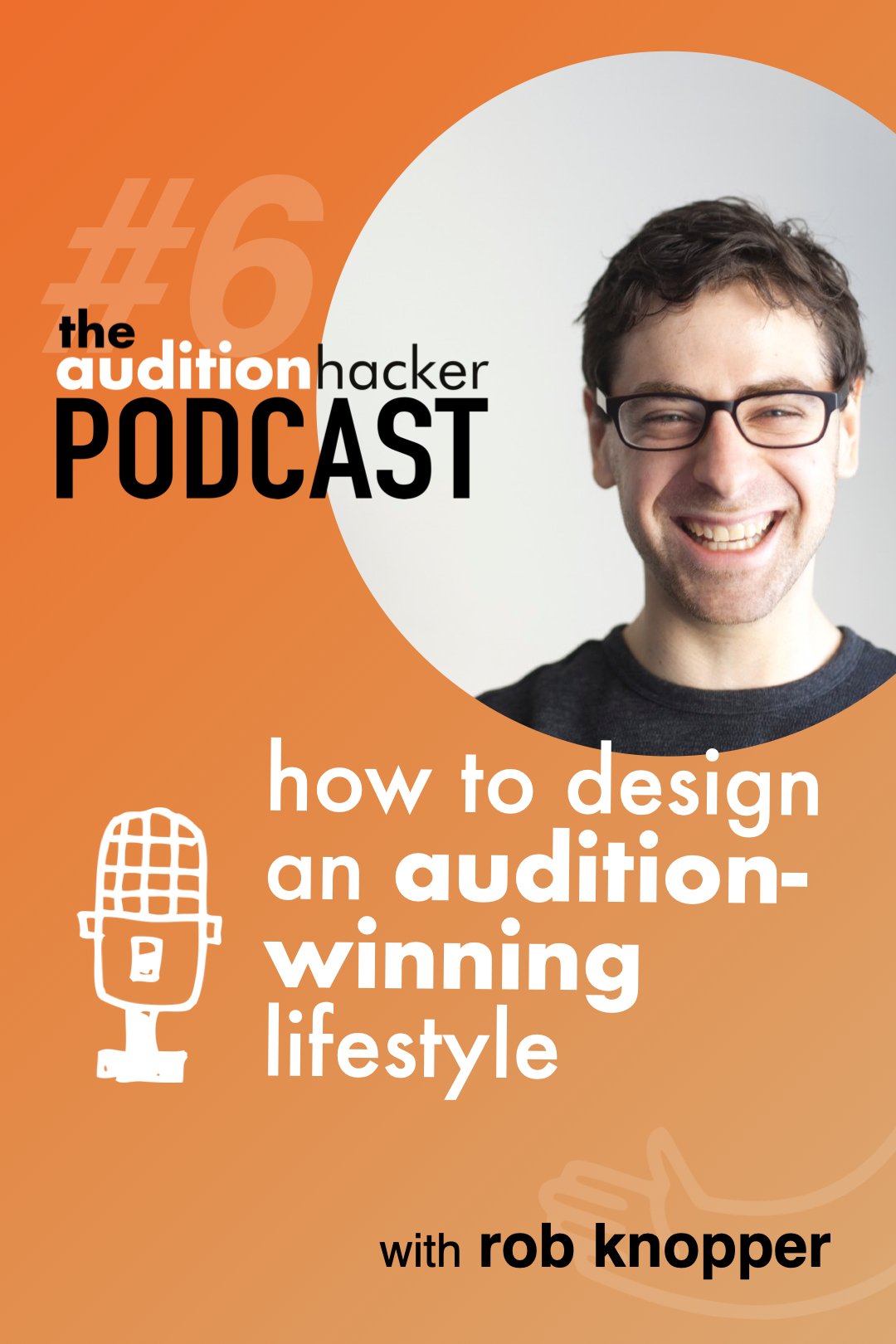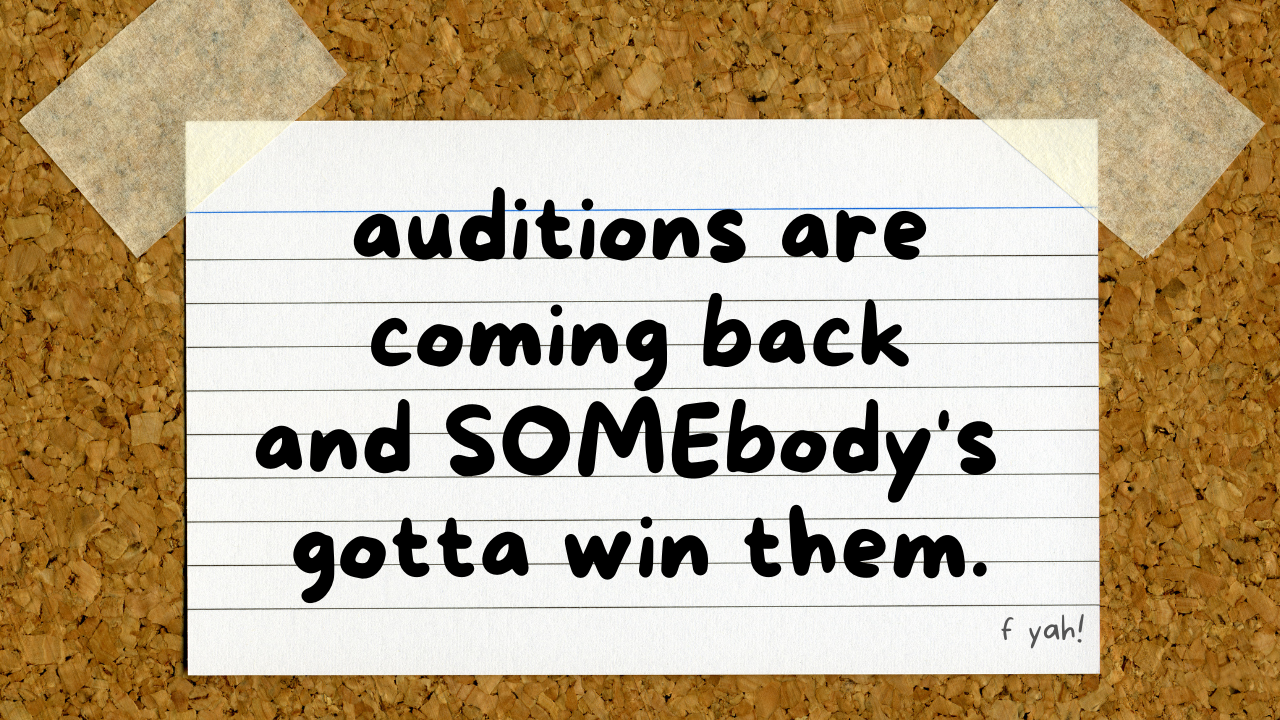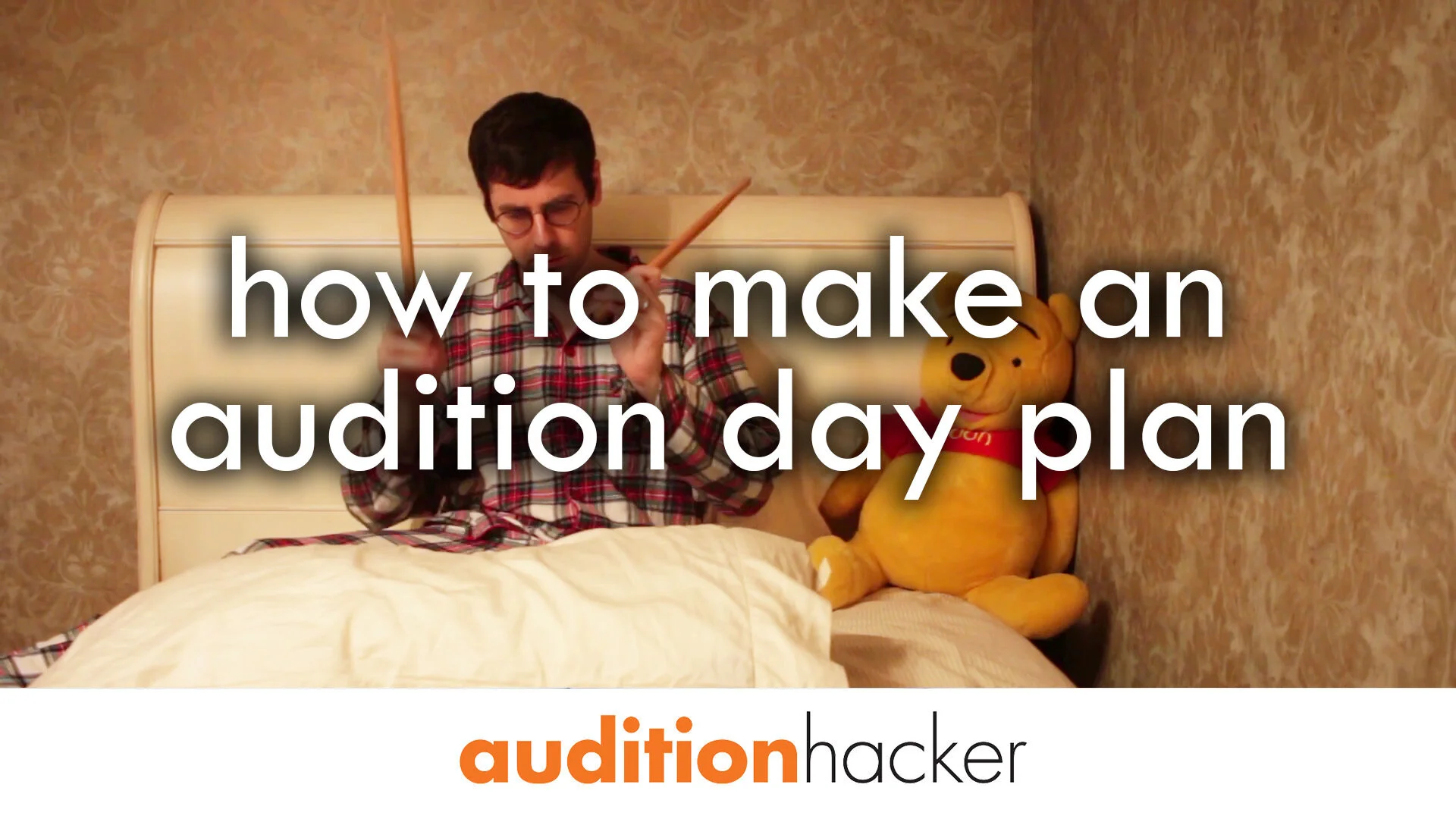hey guys…. i’m back! a lot of fun stuff is coming up in the auditionhacker universe that i can't wait to show you. today, though, is about the fact that i went to a full day of principal 2nd violin auditions at the MET… and lived to tell the tale. Shenghua “Simon” Hu was the winner… he had just won a spot in the back of the 2nd violin section last year, and he knocked it out of the park at this audition.
our comment thread from the auditionhacker alliance facebook group
it was illuminating. i got to hear the panel narrow down the field from 14 semi-finalists to 3 finalists to 1 winner.
what’s going on in the minds of audition jurors has always been mystifying to me, especially when i was preparing for auditions. but it really shouldn’t be a mystery. so, in order to help you better understand auditions and prepare for your own, today i’m breaking down some of the psychology and the humanity behind judging auditions. here are the highlights:
i voted the same way as the 13 string players on the panel
why a non-voting member watches the auditions
how semi-finals work
a juror's biggest responsibility: the binary Y/N decision
the wandering needle
how many excerpts did it take me to give each person a score?
the big surprise: i voted the same way as the string players on the panel.
this audition was for principal 2nd violin of the MET orchestra. it lasted for 3 or 4 days, but the only day i attended was the final day of auditions, which included semi-finals, finals, and super-finals.
there were 13 people on the panel… and they were all string players. i’ll talk about why i was even there in a minute.
considering the fact that there were 13 string players on the panel, i figured that my preferences would be WAY off. i was fully expecting players with bad rhythm to be advanced. i don’t know why… maybe blind prejudice? maybe a false sense of percussive authority over the element of rhythm?
i was also expecting to miss stuff. i thought that the worst case scenario would be that certain people with bad rhythm would advance because of higher-level things like vibrato frequency or bow speed. AKA things that a string player would be hyper-aware of but might go completely over a percussionist’s head.
but, of course, i was wrong.
there were 14 people in the semi-finals, and i “voted” for the same 3 people that advanced.
out of the 3 finalists, i “voted” for the top vote-getter. in this case, no player got a majority of votes from the 13 jurors so there had to be a super-final round between the top two vote-getters.
and in the super-finals, i “voted” for the winner. in fact, i correctly predicted the exact number of votes that each player would get. i’m not publishing the vote counts here, because, well, i’m not sure if i’m supposed to do that.
anyway, i’m going to be completely frank: it felt good to vote “correctly” with the panel. it means that i was pretty much on the same page as the 13 string players on the panel.
want a head start on audition preparation?
here's my 5-step guide to constructing your preparation process and optimizing it for maximum results.
wait a minute. why was i even there?!
fair question.
in MET orchestra auditions, there are supposed to be 13 musicians on the panel. there are also a host of other rules, like the fact that the screen has to completely obscure the applicant, there can be no discussion of individual performances, and each player must be given the chance to play the entire round without being cut off early. there are also other rules having to do with whether a super-final round happens, how a runner-up is chosen, and other stuff.
there are so many rules that one of the rules asks for a member of the orchestra committee to sit and watch the auditions to make sure everything is on the up-and-up. (the orchestra committee is different than the audition committee. the orchestra committee is the one that represents musicians when they negotiate their contract with management. it’s made up of 9 people in the MET orchestra that are elected, whereas the audition committee is made up various of 6-13 people and it’s different for each day of auditions.)
so that’s why i was there. i was the orchestra committee representative to this audition to make sure they followed all the audition rules from our contract.
so while i was not a voting member of the audition panel, i did “vote” all by myself on my notepad just to see how close i got. that’s why all of those times i said that i “voted,” it was in quotation marks.
how the semi-finals worked (and how that affected voting)
when you’re preparing for auditions, you constantly have this thought: “i wonder if the committee is going to like it when i do _____”.
the psychology of the audition panel is complicated, personal, and endlessly variable. but it’s important to try to have some kind of idea of what they’re listening for. because they’re really not just listening for a robot who can nail everything in a mathematically perfect way. (and anyone who says they are is wrong.)
i was present for 3 rounds, and i noticed that my thought process and my own internal psychology was different for each round based on how the vote worked for each round. today i’ll talk about the semi-finals, and i’m going to get into the finals in a future blog.
the semi-finals had 14 people, and the actual voting didn’t happen until all 14 played. so as a juror, you had to listen, make notes, and make a list of people who you were voting for. there was no discussion about the players at all. each player played 6 excerpts all the way through, and at the end, you handed in the list (except for me, obviously). anyone who had 7 or more votes was advanced to the finals.
a juror’s biggest responsibility: the binary Y/N decision
there’s a mortifying pressure weighing you down when you’re judging auditions.
on one hand, you know that these players have put their entire life’s work into this. you hold their future in your hands. you want to be very forgiving, allow them to settle into the audition, and give them a fair opportunity to prove themselves. you root for them because you’ve been there and you know how much it sucks.
on the other hand, if you choose the wrong person then you might get stuck with a really insensitive, unmusical player sitting beside you for the next 30 years. you have pride in your orchestra and you really want the best player to take the job.
the question that jurors are asked in the semi-final round at the MET is this: “is this player one of the best candidates for the job?” and vote either YES or NO.
but… this is kind of an outlandish request. i mean, think about it. each and every excerpt is chock-full of musical elements, from bottom to top. there’s rhythm, dynamics, phrasing, intonation, articulation, character, style, and tempo. and more. it’s not just every excerpt. the space between any two 16th notes has to be the exact number of milliseconds as any other pair of 16th notes in a measure, right? the piano dynamic should be a certain number of decibels louder than the pianissimo dynamic. zoom in to any note in any excerpt and it’s its own little musical world.
an audition juror has to take in everything and boil it down to a yes or no decision. there’s no “the rhythm was good but that phrasing in the 4th excerpt was a little funky” selection on the ballot. nope - it’s yes or no, that’s it.
and here’s why a computer could never do this. each of those elements i listed above? there’s no way anyone is going to do those with 100% accuracy. no matter what you’re measuring… whether it’s the milliseconds of rhythm, the decibels of dynamics, the precise shapes of phrases… there’s always going to be slight variation all the time. a computer would never know what is a ‘natural’ amount of variation and what is a mistake. it wouldn’t know how to prioritize one player’s strengths and weaknesses with another’s.
how’d i make that Y/N decision? ~the wandering needle of my mind.~
as soon as a player starts playing, my brain goes into action.
i flip through the important elements… rhythm, phrasing, consistency, character, and constantly try to correctly analyze each one.
as i make a determination on the level of each thing, this “wandering needle” develops in my mind. the scale goes from zero to ten, and the needle wanders up and down as i hear good and bad things.
while listening to each excerpt, there might be a variation from beginning to end. something i like might happen, followed by something i don’t like as much. the needle ultimately settles on a number that makes me comfortable as representing the entire excerpt and everything inside.
this wandering needle is almost certainly different from one member to the next. this one’s only my own method.
after the first excerpt, the needle will have established a position. it continues wandering after that first excerpt, but it isn’t completely free to move anywhere on the scale. it takes into account the new excerpt that’s happening, but it’s now measuring the average between the first two excerpts.
at the end of every person’s audition, i wanted to end up with a single numerical result from 0 to 10 that i felt accurately represented my opinion about how they played. the final number had to feel exactly right, where if it was pushed up to the next number then that felt too high, but pushed down to the lower one felt too low.
say i ended up with a 4.5, for instance. if that felt “right,” then it was because giving them a 5 felt wrong because maybe they ignored some of the dynamics or played too many notes out of tune, where a 4 felt wrong because they certainly had solid rhythm on almost all of their pieces.
so by the end each person’s round i would end up with a score, and at the end of the semi-finals i had 14 different scores from 1 to 10. at that point i could use those numerical scores to answer the question that i was supposed to be asking, which was “is this player one of the best candidates for the job?”. looking at all 14 different scores, i chose the ones that were obvious outliers. in this case, three people earned scores between 8-10 whereas everyone else was closer to 5 and below.
how many excerpts did it take me to give each person a score?
this is actually a question i get a lot.
well, using my wandering needle approach, it consistently took me between 2-4 excerpts to come up with a numerical score.
as i said, after the first excerpt, the needle would be pointing to a number between 1 and 10. but by that point, i would ALWAYS give them another chance.
throughout the second excerpt, my conclusion from the first excerpt would either be (1.) confirmed or (2.) called into question. if the second excerpt was significantly better than the first, for instance, the average of the two would be in the middle. and if that were the case, i would want to know which excerpt was the fluke and which was the norm for that person. but if the second excerpt was unquestionably the same as the first, i would write down the number.
if i wrote down the number after the first, i wasn’t done, of course. my pencil does have an eraser, after all.
but it was unusual for the first two excerpts to offer that much certainty. usually i still wasn’t sure about my numerical score for the person. i would almost always find that number confidently after the third excerpt, though.
after three excerpts i found the variation to be very little. by that point people had played their best and their worst that they were going to play that day and everywhere in between. for a few people, i was still a little bit on the fence and in those cases i waited until the fourth excerpt was over. but that was rare.
whether it took 2, 3, or 4 excerpts to find that number, eventually i would write down my “final” score for a player. after that, i would still listen very closely and allow change, but in every case the remaining excerpts would just prove the score that i had already chosen.
that’s not to say that i was unwilling to change that final score once it was written down. no: it was just my way of solidifying my opinion. at that point, the ball was in the player’s court to convince me to change it. they had to do something quite extraordinary to change my mind. and i was very open-minded and rooting for a player to persuade me to increase that number. but, like i said, those remaining excerpts were always a reminder that i had already made the correct determination.
so how could a percussionist vote the same way as 13 string players??
certainly everyone’s approach and judging style is different. and the variety of thoughts going through each player’s mind during the performances is expansive. but the FACT that i voted with the panel of string players really meant that we had more in common than we are different.
this was my biggest takeaway. i mean, with all the countless differences in how percussionists and violinists learn music, develop into musicians, and experience life from vastly different perspectives within the orchestra, it still all comes down to this basic fact: everyone’s trying to find the best musician who plays violin. replace that with any instrument, and that’s the goal, i think, of any audition for any major orchestra. you’re always looking for a musician who has been careful and meticulous enough to ensure that the vision they have for each excerpt is fully realized through their instrument. the variety of musical elements are basically the same for everyone. we all care about rhythm. we all need convincing phrasing. we’re all listening for accurate dynamics and articulation.
and it was pretty awesome to be on the same page with all those string players that day.
learn to dominate your audition preparation.
here's my 5-step guide to constructing your preparation process and optimizing it for maximum results.














it's episode #8 of the auditionhacker podcast, and i'll go over my best methods for getting better feedback.